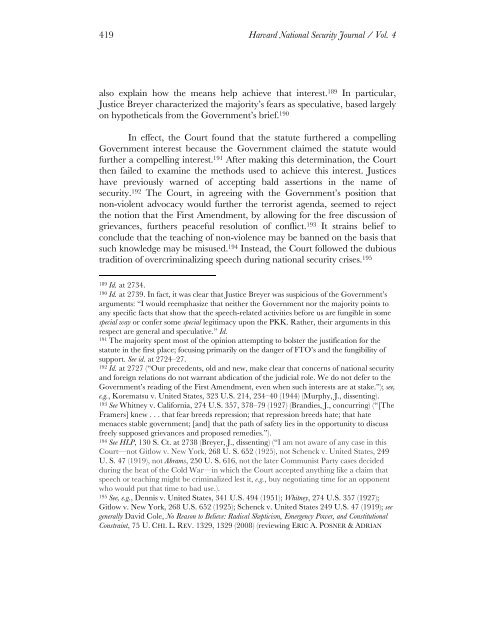Vo.4-Moshirnia-Final
Vo.4-Moshirnia-Final
Vo.4-Moshirnia-Final
You also want an ePaper? Increase the reach of your titles
YUMPU automatically turns print PDFs into web optimized ePapers that Google loves.
419 Harvard National Security Journal / Vol. 4<br />
also explain how the means help achieve that interest. 189 In particular,<br />
Justice Breyer characterized the majority’s fears as speculative, based largely<br />
on hypotheticals from the Government’s brief. 190<br />
In effect, the Court found that the statute furthered a compelling<br />
Government interest because the Government claimed the statute would<br />
further a compelling interest. 191 After making this determination, the Court<br />
then failed to examine the methods used to achieve this interest. Justices<br />
have previously warned of accepting bald assertions in the name of<br />
security. 192 The Court, in agreeing with the Government’s position that<br />
non-violent advocacy would further the terrorist agenda, seemed to reject<br />
the notion that the First Amendment, by allowing for the free discussion of<br />
grievances, furthers peaceful resolution of conflict. 193 It strains belief to<br />
conclude that the teaching of non-violence may be banned on the basis that<br />
such knowledge may be misused. 194 Instead, the Court followed the dubious<br />
tradition of overcriminalizing speech during national security crises. 195<br />
189 Id. at 2734.<br />
190 Id. at 2739. In fact, it was clear that Justice Breyer was suspicious of the Government’s<br />
arguments: “I would reemphasize that neither the Government nor the majority points to<br />
any specific facts that show that the speech-related activities before us are fungible in some<br />
special way or confer some special legitimacy upon the PKK. Rather, their arguments in this<br />
respect are general and speculative.” Id.<br />
191 The majority spent most of the opinion attempting to bolster the justification for the<br />
statute in the first place; focusing primarily on the danger of FTO’s and the fungibility of<br />
support. See id. at 2724–27.<br />
192 Id. at 2727 (“Our precedents, old and new, make clear that concerns of national security<br />
and foreign relations do not warrant abdication of the judicial role. We do not defer to the<br />
Government’s reading of the First Amendment, even when such interests are at stake.”); see,<br />
e.g., Korematsu v. United States, 323 U.S. 214, 234–40 (1944) (Murphy, J., dissenting).<br />
193 See Whitney v. California, 274 U.S. 357, 378–79 (1927) (Brandies, J., concurring) (“[The<br />
Framers] knew . . . that fear breeds repression; that repression breeds hate; that hate<br />
menaces stable government; [and] that the path of safety lies in the opportunity to discuss<br />
freely supposed grievances and proposed remedies.”).<br />
194 See HLP, 130 S. Ct. at 2738 (Breyer, J., dissenting) (“I am not aware of any case in this<br />
Court—not Gitlow v. New York, 268 U. S. 652 (1925), not Schenck v. United States, 249<br />
U. S. 47 (1919), not Abrams, 250 U. S. 616, not the later Communist Party cases decided<br />
during the heat of the Cold War—in which the Court accepted anything like a claim that<br />
speech or teaching might be criminalized lest it, e.g., buy negotiating time for an opponent<br />
who would put that time to bad use.).<br />
195 See, e.g., Dennis v. United States, 341 U.S. 494 (1951); Whitney, 274 U.S. 357 (1927);<br />
Gitlow v. New York, 268 U.S. 652 (1925); Schenck v. United States 249 U.S. 47 (1919); see<br />
generally David Cole, No Reason to Believe: Radical Skepticism, Emergency Power, and Constitutional<br />
Constraint, 75 U. CHI. L. REV. 1329, 1329 (2008) (reviewing ERIC A. POSNER & ADRIAN
















